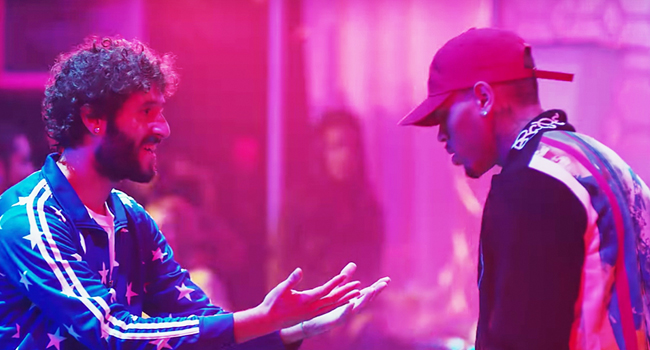
It seems like every two days the collective Twitter wokeness hive mind is big mad about a new thing. Maybe some celebrity tweeted out the wrong political opinion, or perhaps a prominent member of the platform’s intelligencia was caught being less than the paragon of virtue we all like to present ourselves as being online. Whatever the catalyst for the latest case of online outrage, it’s become pretty clear that all this woke trolling still barely moves the needle offline when the news can come down that Lil Dicky and Chris Brown’s high-concept, lowbrow comedy single “Freaky Friday” has reached No. 1 on Billboard‘s Hot R&B Songs chart.
That’s right, the song that features lily-white, jokey rapper Lil Dicky using Chris Brown as a mouthpiece to say the “N-word” without repercussions — repeatedly — and launched a dozen thinkpieces about the inappropriateness of said gimmick is the top R&B song in the country. While we can debate all day about which of the song’s relative merits classify it as “R&B,” it’s important to note that a song featuring both smug, casual “I’m not a racist” racism and the spiritual successor of Ike Turner, one which we’ve all spent weeks decrying online, was catchy enough and popular enough to dominate the charts despite the deluge of online criticism that followed in its wake.
Which begs the question: What’s the point of all this online philosophizing and pontificating if the average listener is just going to keep rewarding performers like Dicky and Brown with accolades and more importantly, with plays on radio and streaming services that will translate into dollars in their respective bank accounts? If nothing else, it only proves we have a long way to go as a culture to truly live up to the lofty ideals of conscientious consumption we hail online. It also proves that while we can put plenty of pressure on Starbucks to force sensitivity training on its baristas and various retailers to stop supporting the NRA, our listening habits still have yet to catch up.
That isn’t to say that we should give up trying to promote those ideals, far from it. If anything, it only illustrates the need to take these discussions offline, to actually address the advertisers, streaming platforms, and family and friends who continue to support abusers like Brown or smirking invective from the likes of Dicky. It also demonstrates how much better we need to get at explaining why these situations need to be taken seriously — it’s more than just entertainment.
Entertainment doesn’t just keep our eyes, ears, and brains occupied as we passively consume the sights and sounds of music videos, television shows, movies, and the like. Over and over again, it’s been consistently proven that the imagery and stereotypes we absorb inform our worldview and our behavior. No, playing a particularly violent game of GTA doesn’t automatically induce spree shootings and carjackings from otherwise docile gamers, just like playing a song from Chris Brown won’t instantly turn every listener into a creepy scumbag who stalks his exes online and lashes out violently at any woman who happens to displease them.
But what those things can do is desensitize the consumer to how dire the consequences of those actions are, and over time, have a cumulative effect of normalizing the behavior across a culture. It’s not just typical internet sensitivity or “overwokeness” to call out abuse jokes on Twitter, because making light of abuse makes abuse more likely, harder to report for victims, and changes attitudes of authorities who won’t take abuse as seriously as they should, only to offer weak, insubstantial platitudes when the abuse reaches its ultimate and frighteningly likely end. That’s why it was so important for Rihanna to call out Snapchat’s insensitive “joke” about her history with Chris Brown, and for Snapchat to face real-world consequences for allowing the ad to run in the first place — so in the future, other companies will see what happened and think twice.
In the same way, joking around about racial slurs can seem like “all in good fun” or “you know I don’t mean it” or “I don’t have a racist bone in my body” or “If they can say it, why can’t we?” sort of harmless proposition, but it still has the effect of othering entire groups of people who society has already marginalized, overlooked, oppressed, and abused. Over time, little by little by little, that othering effect goes from “those people” to “why didn’t he just comply” to “he got what he deserved” to Dylann Roof feeling completely justified in shooting up a church full of worshippers because he truly doesn’t see or value their humanity. Again, it becomes important to confront this behavior — both online and in-person — not because it implies that the person using the term is automatically a Confederate flag-waving, dyed-in-the-wool, Klan member, but because the use without consequence places more and more distance between the people most likely to be victimized and those who would victimize them.
Look, there’s no such thing as a perfect person. There is no way we can possibly only ever consume art and entertainment that never had at least one truly horrendous person behind it. But we can be more cognizant of supporting artists we know to be harmful, and so much better at explaining why it’s important for us to be to our family and friends who don’t follow Deray McKesson or Jesse Williams on Twitter. It isn’t about hating on the wrong kinds of artists or proving how woke we are to strangers online. It’s about what kind of world we want to live in and the messages we send to those of us who are going to build it.






